Adams, Samuel
Adger, Joseph Banneker
Aldridge, Albert Edward
Alexander, Albert and Marie
Algar, Clara Doris
Allan, J.
Amodeo, Francis Edward
Amohia
Anderson, Alfred
Anderson, Arthur
Anglo-American Music Stores
Aplin, Hugh
Arnold R. Kelsey & Co
Atcherley, Henry Mount Langton
Atkinson, Beatrice
Bach, Ellen
Bainbridge, Katherine Mary
Balmer, William
Barlow, Harriet
Barnett, Neville George
Barth, Arthur James
Beale, John Henry
Beale, Susannah
Beath, George
Beck, James Laurian
Begg, Charles
Begg, Jessie
Benbow, Sister Mary Cecilia
Benjamin, Henry
Bennett, John Frederick
Benzoni, Louis Alexander
Bergmann, Eduard
Billows, Walter
Bilton, John
Black, John
Blakeley, Reuben
Blitz, Samuel Louis
Bloy, Herbert James
Bloy, Louis William
Bodle, Eliza Jeanetta
Bond, Frederick
Bonnington, Charles
Booth, Victor George
Bosworth, Thomas Henry
Boult, Arthur
Bowman, James Ogilvie
Bowman, William John
Bowring, Alfred
Bowring, George John
Brabazon, Clarice Edith
Brabazon, Henrietta Charlotte
Bradshaw, John Christopher
Braithwaite, Joseph
Branson, Gerald Charles
Brett, George William Montgomery
Brett, Henry
Bridge, Herbert Bowen
British & Foreign (previously English & Foreign) Piano Agency
Brook, Calypso
Brooke, Harold John
Brown, James
Brown, Joseph
Browne, Ann Maria
Brownlee, George
Brunsden, William Walter
Buckley, Baxter
Bunz, Carl Ferdinand
Burke, Edmund James
Burnes-Loughnan, Mary Ethel
Burr, Edward Albert
Burrett, Robert
Burry, Frederick Charles
Adams, Samuel

11 January 1890, p16. National Library of NZ
Music teacher, pianist, double-bass player, composer
Born: 1867, Liverpool
Died: 1941, Auckland
Active in New Zealand: 1880 – 1941
Samuel Adams studied under Martin Swallow in Auckland, having started music lessons at an early age in England. He established a large teaching studio and was able to form his own student orchestra. He and his father, James Adams, set to music the words of a poem by the local writer W. R. Wills, which they published under the name of Dasma. He was reportedly of a very kindly nature and particularly effective as a teacher of young pupils.
Compositions
The old land and the new. (Auckland: Adams, 1884)
Gaiete de soir. (London: Reynolds, 1904)
EN
***********************
Adger, Joseph Banneker
Organist, music teacher, composer
Born: 1864, Philadelphia, USA
Died: 193-?, USA
Active in New Zealand: 1908-1911
A student in a Special Organ Course, in the Sheffield Scientific School of Yale University, Banneker was a black American organist and composer who wrote and had published many pieces in the early years of his career. For unknown reasons he left the USA and appears for a brief time as a music teacher in Sydney at the beginning of 1908. He then moved to Auckland, taught music and gave a series of organ recitals. In 1911 he was convicted on charges of indecent assault and imprisoned. He returned to the USA on his release.
Compositions (New Zealand only)
American Fleet: march and two-step. (Auckland: 1908)
Resources
LaBrew, Arthur. “Adgar, Joseph Banneker” (Ellis Washington Report – includes list of USA compositions)
EN
********************
Aldridge, Albert Edward
Pianist, bandmaster, printer
Born: 1871, Clyde, Central Otago
Died: 1899, Gore
A. E. Aldridge provided the piano accompaniment for many charity concerts in Queenstown and Gore. He also organised several musical entertainments and was a member of the Queenstown Brass Band. After shifting to Gore to join the newspaper there, he was responsible for forming the Gore Brass Band and became its band master. He died of tuberculosis at the young age of 28.
Compositions
Irene: fantasia for violin and piano. (Unpublished, 1893)
The Lancaster. (Unpublished, 1893)
Orlando march. (Unpublished, 1895)
EN
*********************
Alexander, Albert and Marie
Music retailer, composer
Born (Marie): c1855, unknown
Died (Marie): 1927
Active in New Zealand (Marie): 1879-1927
Active in New Zealand (Albert): fl 1900
Originally a school mistress in Thames, Marie Alexander was associated with the newspaper business for many years on the West Coast, Stratford and lastly the Hawke’s Bay. Between 1901 and 1908 she operated a music dealership in Stratford. Albert Alexander, possibly her husband, but more probably her son, was associated with the business. In 1900 Marie’s Children’s Tales: written in New Zealand for little New Zealanders was published, and in 1901 her song When twilight o’er the sea, was set to music by Albert Alexander and published by Begg’s, for whom Marie Alexander acted as agent.
Compositions
When twilight o’er the sea. (Dunedin: Charles Begg, 1901)
CG
********************
Algar, Clara Doris, nee Hoskin
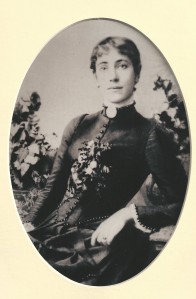
Born: 1860, New Plymouth
Died: 1928, Wellington
Clara Algar’s love of music was such that she named two of her sons Haydn and Beethoven (who went on to become an All Black). She learnt the piano in New Plymouth and shifted to Wellington with her husband. Her personal life was difficult, with an acrimonious divorce and persistent alcohol abuse issues. Despite this she published two pieces and also had several poems published.
Compositions
Our bykes and we. (Wellington: McKee, 1898)
Corona vitae. (Wellington: C. M. Banks, 1914), republished in Living echoes. (Wellington: Sunrise Music Trust, 2014)
EN
********************
Allan, John

Composer
Active in New Zealand: Fl 1891
J. Allan’s only known composition was the Wakatipu Waltz, dedicated to Miss Mary Bond of Queenstown. He was a miner working property in Springvale near Alexandra, Central Otago.
Composition
Wakatipu Waltz. (Dunedin: Charles Begg & Co, c1891)
CG
********************
Amodeo, Francis Edward
Clarinetist, band leader, tailor
Born: 1875, Auckland
Died: 1947, Auckland
Frank Amodeo was one of the many children of master mariner Captain Frank Amodeo. He was educated at Marist Brothers in Auckland and for a few years was, with his brother John, conductor of the Amodeo Brothers String Band. He performed on in the clarinet as part of the Auckland Orchestral Society orchestra, the Bohemian Orchestra and as part of various chamber groups. His sister, Jane, was also an accomplished pianist.
EN
**********************
Amohia – see Atkinson, Beatrice
********************
Anderson, Alfred, RAM
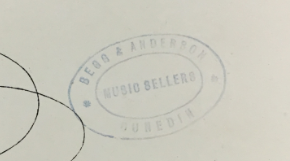
Pianist, composer, music retailer, teacher
Born: 1848, January, Launceston, Tasmania
Died: 1876, 22 March, Melbourne, Victoria
Active in New Zealand: 1873-1874
Alfred Anderson’s father was a professor of music and owned music shops in Sydney and Melbourne. Alfred studied the piano before joining his father in his business. He later went to London to further his studies on the advice of the Duke of Edinburgh who gave him an honorary appointment on his personal staff. On his return to Australia in the early 1870s he began touring as a professional pianist. He first toured New Zealand in February 1873. On 16 June 1873 he entered into partnership with Dunedin music dealer Charles Begg, the business then being renamed Begg & Anderson. Anderson was responsible for organizing touring groups, continuing his travelling life with visits to Melbourne to make arrangements for musical tours while Begg continued to run the retail business and tuning operation. The partnership brought several overseas performers to Otago – the Royal English Opera Company, Allen’s English Opera Troupe and Madame Arabella Goddard. Anderson also taught advanced pupils on the piano while in Dunedin. The partnership between Begg and Anderson was dissolved on 6 October 1874 and he then left New Zealand.
Compositions
The Sunbeam Galop. (Dunedin: Begg & Anderson, 1874)
Other resources
Clare Gleeson. Meet me at Begg’s. (Wellington: Ngaio Press, 2012)
Australharmony – for information on Alfred Anderson’s activities and compositions in Australia
CG
******************
Anderson, Arthur
Organist, music retailer, teacher
Born: 1872, England
Died: 1917, Wellington
Active in New Zealand: 1905-1917
Arthur Anderson was a pupil of Professor Marrison, known as the “Blind organist of Liverpool” and before coming to New Zealand had taught at the Manchester School of Music. In Wellington he was the organist at St Ann’s Church, Northland. He began teaching piano, organ and music theory in 1905. Two years later he opened Anderson’s Piano and Music Depot in Tinakori Road which operated until at least 1912.
CG
********************
Anglo-American Music Stores
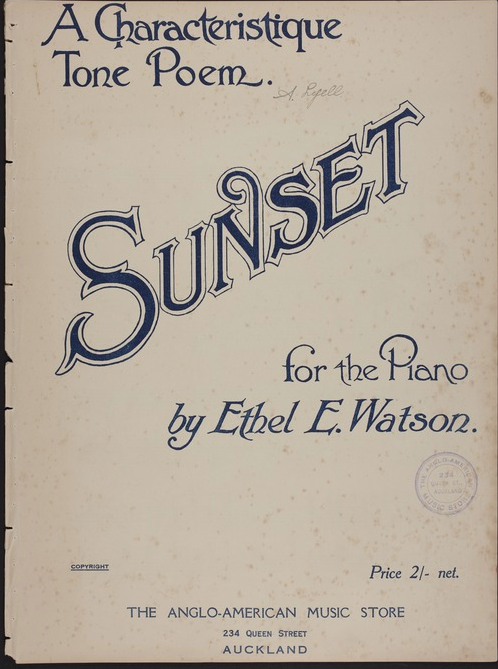
Location: Wellington, Christchurch, Auckland
Established: 1912
Ceased business: 1919
Established by Alec Klippel in Cuba Street, Wellington with branches subsequently opened in Christchurch and Auckland. The Wellington business was subsequently managed by Douglas Lillicrap.
The Anglo-American Music Stores published ten pieces of music between 1912 and 1919 and also produced “National Airs” in 1915 which contained various patriotic pieces.
CG
********************
Aplin, Hugh
Music retailer, piano tuner and repairer, organist, music teacher, conductor
Born: 1847, Devonshire, England
Died: 1895, Napier
Active in New Zealand: 1871-1895
Hugh Aplin operated a music warehouse in Wellington in 1875. Rebuilding after a fire put him in financial difficulties and after bankruptcy proceedings he moved to Napier in 1876. Here he set up as a music teacher as well as piano tuner and repairer, at one stage acting as agent for the Dresden Pianoforte Co. . He was organist at St Paul’s Presbyterian Church for almost 20 years and was also organist for two masonic lodges.
EN
**********************
Arnold R. Kelsey & Co, Music Warehouse
Location: Dunedin
Established: 1879
Ceased business: 1883
The business was opened in Princes Street by Arnold Kelsey and John Jack who had previously worked for Begg’s. It sold pianos, organs, other instruments and music. Arnold Kelsey claimed to have chosen the pianos stocked personally in Europe. In 1880 Mr J. T. Oakden was employed as a travelling piano tuner. The business had agencies in South Canterbury and Oamaru and possibly other locations.
In 1883 the business was closed and Begg’s purchased the stock of music.
CG
********************
Atcherley, Henry Mount Langton
Flautist, band leader, composer, soldier, draftsman, artist
Born: 1836, Canterbury, Kent, England
Died: 1904, Auckland
Active in New Zealand: 1863 – 1904
Atcherley’s legacy in New Zealand is stronger from his work as a water-colourist rather than his contributions to music. Never-the-less he played an important role in a number of musical activities.
He arrived in New Zealand in 1863 as part of a recruitment drive for men to join the 1st Waikato Volunteers. He became Colour Sergeant and served with them until 1870. He was granted some land in Opotiki and in 1873 was appointed as Bandmaster for the newly formed Gisborne Band. He was custodian of the Gisborne Music Hall and performed on the flute at a number of concerts, as well as composing a number of works for the Band.
By the 1880s he had moved to Christchurch as was employed as a draftsman. At this stage his artistic endeavours became more numerous and he was a member of the Canterbury Society of Art. He did continue to contribute to entertainments in Merivale. After living in Sydney for approximately 6 years, he returned to Wellington as a draftsman for the Survey Department, and again continued to perform on the flute at a variety of concerts.
Compositions
Birds of paradise waltz: for flute and piano. (Unpublished, 1873)
Clyde Polka. (Unpublished, 1874)
Peach Blossom Mazourka. (Unpublished, 1874)
Resources:
Atcherley, Henry Mount Langton. In: Find New Zealand Artists website
Atcherley Family Tree Website http://www.atcherley.org.uk/wp/henry-mount-langton-atcherley-and-the-new-zealand-wars-part-1/
EN
*********************
Atkinson, Beatrice (later Tombs)
Violinist, composer
Born: 1872, New Plymouth?
Died: 1951, Wellington
Pseudonym
Amohia
Beatrice (Trix) Atkinson was educated at Nelson Girls College. She learnt the violin. viola and piano and before going to study violin under Emile Sauret at the Royal Academy, London, had 3 songs published under the pseudonym Amohia. She returned to New Zealand, teaching music in Nelson. In 1907 she married Harry Tombs, son of one of the founders of Whitcombe and Tombs, and a printer, artist and musician. She continued to play and teach the violin and support music and the arts in Wellington. In the 1940s, as Beatrice Tombs, she wrote a number of further songs, both published and unpublished.
Compositions
Eventide. (1899)
A Lament, and, To the breezes. (?, 1900)
Legend of the cuckoo. (Wellington: Harry H. Tombs, 194?)
Te Ngaru’s flute song. (Wellington: Wingfield Press, 194-)
There fell a king. (Wellington: Harry H. Tombs, 1942)
Two songs. (Wellington: Harry H. Tombs, 1944)
Prospice. (194? – unpublished)
EN
********************
Bach, Ellen
Music teacher, pianist, composer
Born: 1816?, Birmingham, England
Died: 1894, Christchurch
Active in New Zealand: 1862-1894

Ellen Bach arrived in New Zealand with her engineer husband Richard in 1862. They lived in various locations and after his death she settled in Gisborne where she earned her living as a music teacher, also performing in a number of amateur concerts.
In 1883 she wrote and, possibly at her own expense, published a short piano waltz, Southern Pacific, which was widely distributed throughout New Zealand.
Compositions
Southern Pacific. (Gisborne, 1883)
EN
********************
Bainbridge, Katherine Mary
Music teacher, pianist, composer
Born: 1851, Leeds, Great Britain
Died: 1919, Wellington
Active in New Zealand: 1909-1919
Katherine Bainbridge and her husband Harry migrated to New Zealand from South Africa. She was a music teacher in Wellington and her advertisements note that she had attended the Stuttgart Conservatorium and received a Licentiate from the London College of Music and was an Associate of the Victoria College of Music.
Compositions
Our Empress Queen (Unpublished, pre-1901)
Royal wedding: song (Unpublished)
The Coming of Queen Mary (Wellington: Ferguson & Hicks, 1910)
EN
********************
Balmer, William
Bandmaster, clarinetist
Born: 1827, County Armagh, Northern Ireland
Died: 1869, Auckland
Active in New Zealand: 185?-1869
William Balmer was a member of the 65th Regiment for over 20 years. When he took his discharge in New Zealand he had reached the rank of Band Sergeant. He settled in Auckland where he had both a brass band and quadrille band which performed at concerts and dances. He was also Bandmaster of the Auckland Volunteers Band.
HIs brother John, also a member of the Band of the 65th Regiment, died after a shark attack in Wellington in 1852.
EN
*******************
Barlow, Harriet

Composer
Born: 1835, London
Died: 1913, London
Active in New Zealand: 185?-1858
Harriet Barlow’s (nee Rosselli) muiscal life remains somewhat of an enigma. Her two known pieces seem to have been published in Sydney. Her New Zealand Polka was “Respectfully dedicated to the settlers of New Zealand by the composer” and advertised for sale by Thomas Barlow in Wellington in 1858. Harriet and Thomas were married in London in 1855 and sailed to New Zealand after that. They returned to England in 1858 and Thomas died in December that year. Harriet worked as a Housekeeper and Governess for a while before returning to live with her family in London.
Compositions
Carthagonian march (Sydney, 1858?)
New Zealand Polka (Sydney: J.R, Clarke, 1858?)
EN
*********************
Barnett, Neville George
Organist, choral conductor, composer
Born: 1854, London
Died: 1895, Picton, New South Wales, Australia
Active in New Zealand: 1874-1887
Barnett had very recently completed his examinations as a Fellow of the Royal College of Organists before setting sail to New Zealand for reasons of his health. He first settled in Christchurch, taking on the role of organist at St John’s and then St Luke’s. He designed the specifications for a new organ at Christchurch Cathedral, supervised its building and played the organ at the Cathedral’s consecration in 1881.
In 1884 he moved to Auckland as organist at St Matthews and was also very involved in the Diocesan Choral Festivals. He moved to Sydney where he was appointed organist at St Mary’s. He composed a number of pieces for services and also wrote on music history. His one published work for the organ was written for the opening of Christchurch Cathedral.
Compositions
Motivo perpetuo, for organ. (London: Novello, Ewer & Co, 1883)
Resources:
E. J. Lea-Scarlett, ‘Barnett, Neville George (1854–1895)’, Australian Dictionary of Biography, National Centre of Biography, Australian National University, https://adb.anu.edu.au/biography/barnett-neville-george-2940/text4259, published first in hardcopy 1969, accessed online 6 September 2021.
EN
*********************
Barth, Arthur James

Pianist, organist, music teacher
Born: 1850, London, England
Died: 1905, Dunedin
Active in New Zealand: 1881-1905
Migrating to New Zealand to join his wife’s family in Dunedin, Arthur Barth was already a well established musician. He had published 14 works, performed as piano soloist in a concert of Hiller’s Concerto in F sharp major at an Exhibition concert at the Royal Albert Hall in 1873, and was organist at Christ Church and St Mary Abbots in Kensington.
A few years after his arrival in Dunedin he was appointed as the first organist at Knox Church, a position he held for twenty years. He was also the first representative for Trinity College, London, conductor of the Dunedin CHoral Society and Dunedin Liedertafel, and president of the Society of Musicians of Otago. Apart from music, he had an ongoing interest and involvement in photography and bowling, and was active in Freemasonry in Dunedin.
Three of his daughters, Beatrice, Ruby and Irene, went on to establish the Barth School of Music which was part of the musical establishment of Dunedin from 1921-1972.
Compositions:
A little ship was on the sea, sacred song. (London: 1871)
Impromptu in A for pianoforte. (London: 1875)
Chromatic rondo for the piano. (London: 1876)
Constant: song. (London: 1876, and, Dunedin: Apollo Music Album No, 1, 1895)
Cradle song. (London: 1876)
Dewy evening. (London: 1876)
Fair Ellen wept. (London: 1876)
Gazelle waltz. (London: 1876)
A gentle breeze: nocturne for the piano. (London: 1876)
I stood on the shore. (London: 1876)
The lovely cottage child: song. (London: 1876)
Welcome to spring: morceau de concert for the pianoforte. (London: 1878)
Feuilleton, galop de concert pour piano. (London: 1879)
Our New Zealand Christmas song. (Dunedin, 1882)
Exhibition anthem, for chorus and orchestra. (Dunedin: Payton & Corrigan, 1889)
Grand old British game. Christchurch: Lyttleton Times, 1889)
Marcia in F. (Dunedin: Begg’s, 1892)
The hope of heaven. (Dunedin: Apollo Music Magazine, No.1, 1895)
March of New Zealand: song. (Dunedin: Begg’s, 1897)
Sons of the Southern Cross. (Dunedin: 1900)
Other resources:
Cyclopedia of New Zealand : Otago and Southland Provincial Districts, p. 216 (Photo source)
“Mr Arthur J Barth”. NZ Illustrated Magazine, 1 August 1900, pp14-15.
Murray, David. Arthur James Barth. https://cemeteries.org.nz/stories/BarthAJ.pdf
EN
********************
Beale, John Henry
Music teacher, violinist, choirmaster, music retailer, composer, bandmaster
Born: 1819, England
Died: 1882, Auckland
Active in New Zealand: 1858-1882
John Henry Beale and his family settled in Auckland after a few years in Monganui, Northland. He was a music teacher by profession, active in the early years of the Auckland Choral Society, and choirmaster at St Sepulchre’s Church. He was also Bandmaster of the Auckland Volunteer Rifles Band in the 1860s. Beale composed a few short works in Auckland as he had in England before immigrating.

Compositions
California quadrilles. [England: Unpublished, 1849]
Ascot galop. (London: 1852)
The red, white and blue quadrilles. (Unpublished, 1861)
Rangiriri galop. (Auckland: 1864) – 2 editions
Never mind the rest. (Auckland:, 1873)
The Fisherman’s song. (Unpublished, 1877)
Although the fig tree shall not blossom. Unpublished, 1879.
EN
********************
Beale, Susannah
Pianist, harmonium player, accompanist
Born: 1844, Wimborne, Dorset, England
Died: 1921, Tonbridge, Kent, England
Active in New Zealand: 1858-1869
Susannah Beale was the eldest of John Henry Beale’s many musical children. She was only 13 years old when she performed in the first of many family concerts, in which she was almost always referred to as “Miss Beale”. In 1862 she gave a solo concert at the Auckland Mechanics Institute and in 1864 took on the role of pianist for the Auckland Harmonic Society. She also played the harmonium for St Sepulchre’s church and on resigning when she was married in 1869 she was presented with a workbox made by Anton Seuffert in recognition of her three years of service there.
Soon after her marriage to Robert Case they returned to England. After he died in 1877 she married Herbert Wills. She remained in England for the rest of her life.
EN
*********************
Beath, George
Violinist, music teacher, composer
Born: 1870, Portmoak, Scotland
Died: 1930, Dunedin
Active in New Zealand: 1877?-1930
Beath celebrated his Scottish heritage in his violin playing in Dunedin. He performed in various ensembles along with other Dunedin musicians such as Paulk Sonderhof and Alf Pettitt.
Compositions
Airship Waltz (Dunedin: 1909)
Queen of the Carnival Waltz (Dunedin: 1916)
EN
*********************
Beck, James Laurian

Violinist, music teacher, orchestra leader and conductor, composer
Born: 1870, Perth, Western Australia
Died: 1932, Christchurch
Brought to New Zealand as a child, James Beck travelled to England to study the violin and achieved the Associate Diploma of the College of Violinists. He returned to Whanganui where he established his school of music, and also the James Beck Orchestra. He taught violin at Wanganui Collegiate and lead the orchestra in several variety theatre productions.
Compositions:
Fidelity waltz (Unpublished, 1891)
To an Aeolian harp (Unpublished, 1896)
Zealandia: the Skipping Rope barn dance (Whanganui: Willis, 1902?)
Overtures for Paradise New Zealand (Unpublished, 1904)
Chaplin’s Chips (Unpublished, 1917)
Peace with honour, hail to Thee: for male voice choir (Unpublished, 1919)
Resources:
Cyclopedia of New Zealand : Wellington Provincial Districts, p. 1397 (Photo source).
EN
**********************
Begg, Charles
Music retailer, pianoforte maker
Born: 1825, Aboyne, Aberdeenshire, Scotland
Died: 1874, 21 December, Dunedin, New Zealand
Active in New Zealand: 1861-1874
Charles Begg trained as a pianoforte maker and tuner in Aberdeen. Before emigrating to Otago in 1861 he employed nine men in his piano factory in that city and had a retail business selling pianos, other instruments and printed music.

He arrived in Dunedin in 1861 with a stock of four pianos and established himself as a piano tuner, seller and manufacturer. Despite winning a bronze medal for a piano in New Zealand woods at the 1865 New Zealand Exhibition he decided not to pursue manufacturing pianos but concentrate on imported instruments. His premises in Princes Street were destroyed by fire in 1867 and replaced with a substantial three-storied building. In addition to selling music Begg also published several original New Zealand compositions and supported musical endeavour in Dunedin, providing a practice room for the Dunedin Volunteers band and the Orchestral Society.
In 1873 he went into partnership with Australian pianist and composer Alfred Anderson. The partnership was dissolved two months before Begg’s death. Begg’s business was carried on by his wife, Jessie, with the help of two trustees and the chain of music retail stores he founded continued to operate until 1970.
Other resources
Clare Gleeson. Meet me at Begg’s: the story of Charles Begg & Co, music and appliance manufacturers and retailers, 1861-1970. (Wellington: Ngaio Press, 2012)
Cyclopedia of New Zealand : Otago and Southland Provincial Districts, p. 224.
CG
*******************
Begg, Jessie
Music retailer
Born: 1832, Aberdeen
Died: 1914, Dunedin
Active in New Zealand: 1861-1898
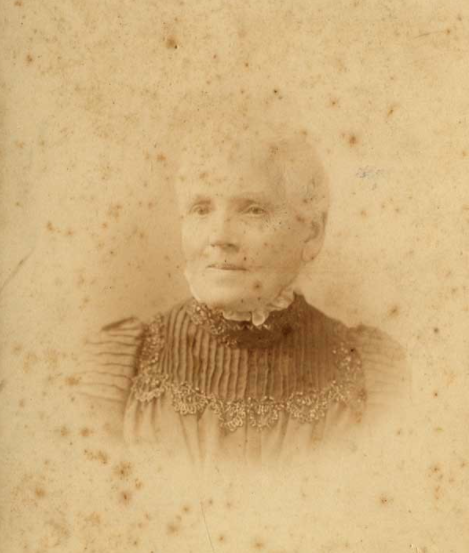
Jessie and her husband, Charles Begg, were cousins. Jessie was educated and it seems highly likely she was involved in the Begg business in Aberdeen before moving to New Zealand. In New Zealand she probably worked in the shop while Charles travelled throughout Otago tuning pianos and she also ran a boarding house in Smith Street. When Charles died in 1874 Jessie was left with seven children and an insolvent business. With the help of Charles’ other two trustees she built up a business that was financially successful and expanding into other areas in New Zealand by the time she retired, leaving management of the business to her two sons, Alexander and Charles. The success of her impact on the business can be measured by the amount she gifted to her children some years before her death, which constituted nearly six times the level of legacy that Jim McAloon used as a means of categorising the “wealthy”.
Other resources
Clare Gleeson. Meet me at Begg’s: the story of Charles Begg & Co, music and appliance manufacturers and retailers, 1861-1970. (Wellington: Ngaio Press, 2012)
CG
********************
Benbow, Sister Mary Cecilia

Sister of Mercy, composer
Born: 1840?, Birmingham, Great Britain
Died: 1922, Wellington
Active in New Zealand: 1873-1922
Sister Mary Cecilia Benbow (birth name Ann Agnes Benbow) came to New Zealand from Australia to help with the establishment of the Sisters of Mercy in Wellington, later travelling to Europe to recruit sisters. Her piece was written under the initials M. C. B. and included words written by her mother, Lucy Young Ball.
Composition
New Zealand Evening Hymn. (Wellington: Burrett, 1874)
Resources
Howe, M. Augustine. Mother Cecilia Benbow (Australia: Sisters of Mercy, 1988)
EN
********************
Benjamin, Henry
Band conductor, composer, loan agent
Born: 1850, London, England
Died: 1927, Uxbridge, England
Active in New Zealand: 1873-1897
Benjamin came to Dunedin as a young man to set up a branch of the Melbourne firm Benjamin Brothers in Dunedin. He was elected as conductor of the Dunedin Engineer’s Band in December 1886 and it was for this group that he composed a number of short pieces. It appears that he may have been the Henry Benjamin who had been a music teacher and composer in Melbourne in the late 1860s and early 1870s, and when he left for England in 1897 his effects put up for auction included a Lipp upright grand piano. His daughter, Ethel, was New Zealand’s first woman lawyer.
Compositions
Heel and toe (Dunedin: Dresden, 1888)
Royalties Grand March (Dunedin: George, 1888)
Dhurbar song and chorus (Unpublished, 1894)
Resources
“Henry Benjamin”. Australian Variety Theatre Archive, https://ozvta.com/industry-people-a-l/
EN
***********************
Bennett, John Frederick
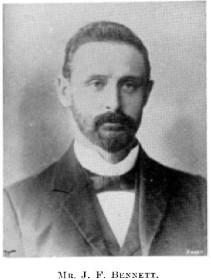
Music teacher, music critic, organist and choirmaster
Born: 1867, Auckland
Died: 1930, Auckland
John F. Bennett studied piano with Martin Swallow and organ with Angelo Forrest and Tallis Trimnell. He established a music school and developed a reputation as an excellent teacher. He was organist at a number of churches including St Paul’s, Devonport Presbyterian, Knox Church and the Unitarian Church.
He was music critic for the Auckland Star for several decades and on his death, a collection of over 200 music scores and books, in some cases annotated with his comments about a performance, were donated to the Auckland Public Library as the John F. Bennett collection.

Auckland Libraries Heritage Collections NZG-19041217-26-2
Resources
Cyclopedia of New Zealand : Auckland Provincial District, p.259 (photo source)
EN
**********************
Benzoni, Louis Alexander

Composer, bicycle and motorcycle retailer and repairer
Born: 1879, Wellington
Died: 1965, Auckland
Louis Benzoni attended Thorndon School in Wellington. He wrote a number of songs with Good old New Zealand selling over 50,000 copies combined of its sheet music edition and recording. He also wrote a version for the Australian market – Good old Australia. While Benzoni composed the tune and words to most of his songs, the piano arrangements were generally set by other New Zealand musicians, including James G. Leonard, Ivan Levy, Raymond Hope and Claude Haydon. Two of his songs were performed at the Festical of New Zealand music, held in Christchurch in 1916.
Compositions
You can dream as you’re skipping from star to star. (Melbourne: Allan, 1903)
Do you remember. (Wellington, 1904)
Monowai: song. (Adelaide: Cawthorne, 1906)
Sunshine of my soul. (Wellington: Charles Begg, 1909)
Good old New Zealand. (Christchurch: Australasian Music, 1914)
Crossing the bar. (1916)
When the light is low. (1916)
Good old Australia. (Christchurch: Australasian Music, 191?)
Wait till the clouds go by. (Christchurch: Australasian Music, )
Back to home, sweet home – and you. (1918)
Where the Wanganui flows. (Christchurch: Australasian Music, 1922)
The orange girl waltz. (London: Fred Fisher’s, 1932)
Boy of mine. (Wellington: Australasian, 1943)
You must not bust the chrome. (Auckland: Marisposa, 1956)
EN
*********************
Bergmann, Eduard
Bandmaster, flautist, composer
Born: 18??, Hungary?
Died: ?, England.
Active in New Zealand: 1863-1865
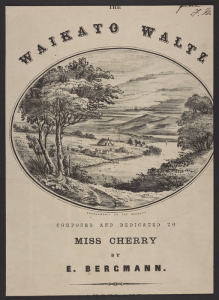
Bandmaster of the 2nd Battalion, 18th Royal Irish Regimental Band, Bergmann arrived in Auckland in 1863. He composed a number of works which were performed by his and other regimental bands one of which, the Waikato Waltz, was published. Bergmann was a flautist, and the band performed at a number of civilian concerts as well as military events. A number of Bergmann’s compositions and arrangements had been published in various Military music magazines held at the British Library.
Compositions
Waikato Waltz. (Auckland: Varty, 1864)
Other resources
Nichol, E. “In search of Eduard Bergman, regimental bandmaster in the 1860s Waikato Land Wars”, Crescendo, 71 (2005), p. 7-10.
EN
*******************
Billows, Walter George
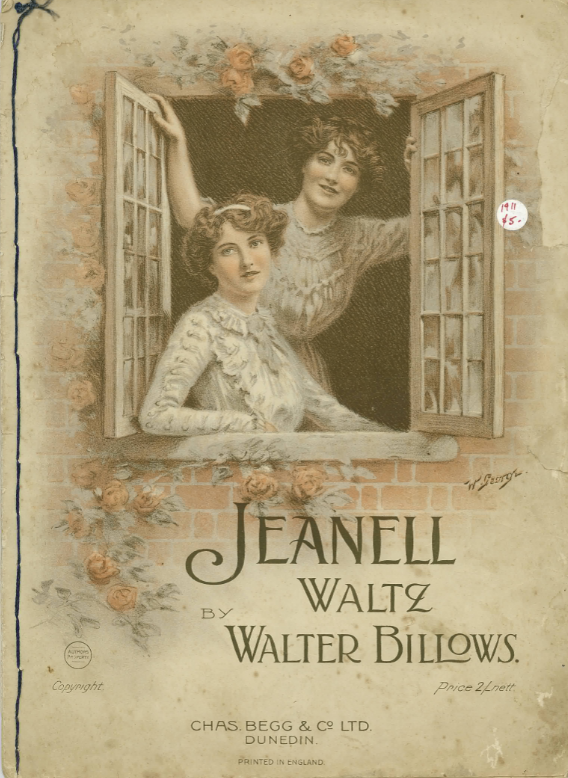
Photographer, composer
Born: 1867, Nelson
Died: 1938, New Plymouth
Walter Billows was a photographer in Whanganui and President of the Dannevirke Orchestral Society.
Compositions
Jeanell waltz. (Dunedin: Charles Begg & Co, 1911)
CG
********************
Bilton, John
Organist, music teacher, conductor, book and music retailer
Born: 1830, Cambridge, England
Died: 1894, Timaru
Active in New Zealand: 1850-1894
John Bilton was selected from the Battersea Training College to go to Christchurch as one of the first teachers to take charge of church schools in the new Canterbury settlement. He arrived on the George Seymour in 1850 and was appointed as organist of St Michael’s Church. He was singing master at Christ’s College, and helped form the Lyttleton Choral Society, also conducting the Christchurch Choral Society.
By the mid-1860s he decided to join a member of his wife’s family in the book, stationery and music shop Inwood & Bilton, firstly in Christchurch but soon moving to Timaru. While in Timaru he continued to teach music privately as well as at the local school, established and led the Timaru Choral Society and established church choirs in both the local Anglican and Presbyterian churches. He also provided accompaniment for many concerts and on occasion took part as a vocalist. From the 1880s he was an examiner in music for Education Department, assessing pupil teachers.
EN
********************
Black, John
Flautist, violinist, organist, teacher, music retailer, conductor,
Born: 1853, Nelson
Died: 1927, Australia
Active in New Zealand: 1877-1909
Born into a musical family in Nelson, John Black and two of his brothers set up a fishery on Stewart Island in 1877, announcing the arrival of their catch at Invercargill with tunes on the cornet. Resident in Invercargill he was conductor of the Riverton Brass Band in 1884 and of the Invercargill City Band in 1886. In 1888 he became Begg’s Invercargill agent, selling pianos, organs and sheet music.
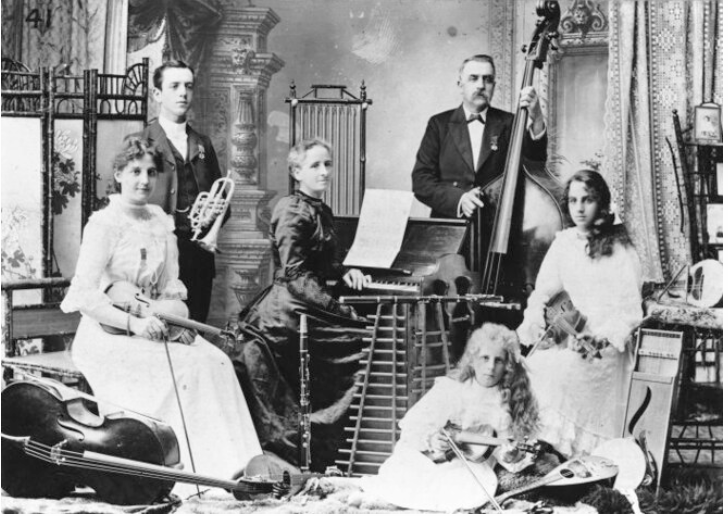
He formed a musical group from members of his family and in 1900 they moved to Dunedin. Daughter Nellie (Ellen Vaughan), singer and violinist was the outstanding performer in the group.In 1902-03 the family toured the South Island for seven months and then undertook a 15 month tour of the North Island. In 1905 they moved to Sydney and toured Australia for several years, returning to New Zealand to tour in 1909 when they were touted as “The Musical All Blacks of Maoriland”. They returned to Australia and by 1912 the musical group had ceased to exist. John Black died in Australia.
CG
********************
Blakeley, Reuben
Music teacher, organist, composer, local body politician
Born: 1834, Batley, Yorkshire, England
Died: 1904, Kaiapoi, Canterbury
Active in New Zealand: 1880-1904

Reuben Blakeley was 46 when he left Batley and his work in the woolen trade for New Zealand. He had been organist at the Zion Church and was soon appointed organist at Kaiapoi Weslyan Church. He also conducted local bands and composed a number of works, mostly unpublished, for performance in the church one of which, his anthem “The White Horse”, lasted 25 minutes. Mayor of Kaiapoi in 1891 he also served on the Kaiapoi District Council.
Compositions
[Collection of anthems edited by Henry Watson]. (London: Novello, 1902) unconfirmed
Resources:
Cyclopedia of New Zealand : Canterbury Provincial District, p. 427 (photo source)
Macdonald dictionary, Canterbury Museum.
EN
********************
Blitz, Samuel Louis

Louis Blitz in middle, front row.
The New Zealand Graphic and Ladies Journal, 13 July 1907, p.13. Auckland Libraries Heritage Collections NZG-19070713-0013-02
Double-bass player, cellist, music concert promotor, music teacher, conductor
Born: 1873, Rotterdam
Died: 1963, Sydney
Active in New Zealand: 1901-1925
Louis Blitz came to New Zealand from Australia to perform with the touring English Grand Opera Company. After the tour finished he settled in Auckland, where he taught and took part in numerous musical events. He was the conductor of the Orphan’s Club Orchestra and with Lillian Tree held a series of concerts. He also organised a group of chamber musicians (including himself on cello) which toured the country. He returned to Sydney for a short period in 1909 but then came back to Auckland where he became involved in the Auckland Musicians Union and Auckland Professional Orchestra.
In the early 1920s he relocated to the USA where he had a contract with the San Francisco Symphony Orchestra. He returned again to Auckland for a short time before permanently shifting to Sydney where he was on the staff of the Sydney Conservatorium.
EN
**********************
Bloy, Herbert James
Violinist, music teacher, conductor, timpanist
Born: 1876, London, England
Died: 1923, Wellington
Active in New Zealand: 1904-1923
Listed in the 1901 English Census as an Architectural Draftsman, Herbert Bloy was also a trained violinist, advertising that he attended the Guildhall School of Music. He seems to have joined his brother Louis in 1904 after the death of their mothe. He was Leader of the orchestra that accompanied the C. H. Harriss tour of the Sheffield Choir in 1911, conductor of the Auckland Orchestral Society, and from 1911 conductor of the Wellington Professional Orchestra.
Publication
Talk to amateur violinists. (Wellington: Progess, 1911)
EN
*********************
Bloy, Louis William
Music teacher, banjo player, composer
Born: 1878, London, England
Died: 1944, Christchurch
Active in New Zealand: 1904-1944
Louis Bloy left England in 1897 as a farm cadet, settling in Christchurch. He formed his own Banjo Band which performed at a variety of events.
Composition
Bloy’s First Waltz. (Wellington: King, 1901)
EN
**************************
Bodle, Eliza Jeanetta
Pianist, composer
Born: 1845, India
Died: 1927, Auckland
Active in New Zealand: 1874-1927
Eliza Bodle was a long-serving Sunday School teacher in the Church of Christ. She and her husband, Dr G. E. Bodle, settled in Alfriston, south of Auckland. One of her sons served in the 1899 South African War and this no doubt formed the impetus for the first of her two published songs.
Compositions
Song of the Soldier’s Mother. (Auckland: 1899)
A Song of Summer. (Auckland: New Zealand Herald Works, 1901)
EN
*********************
Bond, Frederick
Journalist, Hansard reporter, composer
Born: 1862?, Manchester, England
Died: 1890, Melbourne
Active in New Zealand: 1873 – 1888
Frederick Bond worked on various Australian newspapers before moving to Dunedin to work on the Otago Guardian. After a short time with the Otago Daily Times, he moved to Wellington, becoming a reporter for Hansard. Two of his compositions were published, one during his time in Dunedin and one while he was in Wellington. He moved to Melbourne before his early death in the Kew Asylum.
Compositions
The Times. (Dunedin: New Zealand Musical Magazine, No.1, 1879), also (Melbourne: Glen)
Silver Moonbeams. (Auckland: New Zealand Muse, 1880)
EN
**********************
Bonnington, Charles
Violinist, organist, pianist, music retailer, music teacher, composer, publisher
Born: 1830, Chesterfield, England
Died: 1883, San Francisco, USA
Active in New Zealand: 1853-1880

Bonnington’s musical training started in his native Chesterfield in Derbyshire where he studied with Tallis Trimnell. He came with his parents and 8 siblings to Nelson in 1853 and quickly became involved in music activities. He helped form the Nelson Musical and Dramatic societies, played at the local church, conducted the Nelson Volunteer Regiment Band and taught music and dance.
In 1860 he moved to Christchurch where he opened a stationers shop which also sold music. He became the leader of the Christchurch Musical Society’s orchestra, conducted this and other musical ensembles and taught until his departure for Auckland in 1869. During this time he also branched out to publish the music of other local composers, having had a number of his own compositions published in the early 1860s. After a few years he returned to Christchurch before moving again to Wellington and establishing his “Music Academy” in Lambton Quay as both a teaching location and retail shop. His skills as a violinist continued to be remarked on and he was heavily involved in many of the musical activities of the capital.
In 1880 he and his family moved to San Francisco, where he died three years later. His brother George was also a noted violinist in Christchurch as well as a chemist, inventing the popular cough tonic, Bonnington’s Irish Moss.
Compositions
Anna schottische. (1846)
Emmeline polka. (1849)
Georgiana polkas. (Sydney: 1853)
Australasian galop. (Sydney: Wilkie, 1860)
Southern Cross schottische. (Sydney: 1860)
Southern Alps schottische. (1864)
Stars of the southern night – vocal ensemble. (Unpublished)
Mt Cook waltzes. (Unpublished)
Anthem for Masonic services. (Unpublished)
Other resources
Nichol, E, Dedicated to the colonial music public, p. 53-61.
Photo Source
Reproduced with the permission of Bonnington family descendants.
EN
********************
Booth, Victor George
Professor of music, music examiners, composer, writer
Born: 1880, Oamaru
Died: 1948, England
Active in New Zealand: To 1903
Victor Booth’s aptitude for the piano was noticed early in his life. A pupil of Arthur Barth in Dunedin her performed very well in the examinations of the Associated Boards of Music. Leaving his practice as a music teacher in Oamaru he travelled to the Royal Academy of Music where he received various honours including the Macfarran Gold Medal in 1907. He was appointed as a Professor of music at the Royal Academy in 1913 and later in life wrote the book We Piano Teachers. He was also an examiner with the Associated Boards and Royal College of Music.
Compositions
The Bow song (Unpublished, 1902)
The Sunbeam. (London: Reynolds, 1902)
With all my heart. (London: Reynolds, 1904)
Truth. (London: Novello, 1908)
Under the rose. (London: Reynolds, 1908)
Resources
Jane, Philip. “Victor Booth: a colonial musician returns ‘Home'”, Crescendo, 102 (2018), p. 6-12.
EN
*********************
Bosworth, Thomas Henry

Music teacher, violinist, pianist, music retailer, composer
Born: 1858, Nottingham, England
Died: 1905, Auckland
Active in New Zealand: 1898-1905
Thomas Bosworth first migrated to Australia in 1883 where he worked in a number of states including New South Wales and Tasmania before moving to New Zealand “for climatic benefits”. He taught in Auckland for some years before moving to Hamilton where with his wife, Anna Victoria nee Thompson, he established the Hamilton Music School. He also conducted a number of local regional orchestras and was local secretary for Trinity College London. After his death his wife continued to run the School, and his daughter Ina (Geraldine May) was an accomplished violinist. Bosworth was also a keen dog breeder, poultry breeder and member of the Hamilton Bowling Club.
Compositions
Exhibition waltz (Launceston: Bosworth, 1891?)
Beautiful South Esk: waltz. (Launceston: Bosworth, 189-)
Souvenir Corra Linn (London: Reid, 189-)
Britons Brave and True (Auckland: Star, 1899, and London: Wickins, 1900)
Douglas Gavotte ()Unpublished, 1904)
Springtide (London: B. WIlliams, 1904)
Resources
Australharmony, for his Australian residency.
Cyclopedia of New Zealand : Auckland provincial district p259 (photo source)
EN
********************
Boult, Arthur
Organist, music teacher, conductor
Born:1851, Manchester, England
Died: 1926, Auckland
Active in New Zealand: 1893-1926
Boult had been living and working in Australia for 20 years before he moved to New Zealand having visited Rotorua and finding it helpful for his rheumatism. He had been organist at the Adelaide Cathedral for almost 16 years and founded a number of leading musical institutions including the Adelaide Philharmonic Society. With his wife, Maud Marion nee Gawler, they established their school of music in Auckland. He was conductor of the Auckland Bach Society, choir master of St Thomas’s and gave lectures on a number of musical topics.
Compositions
New Zealand National Anthem. (Auckland: New Zealand Graphic, 1897)
The Motherland Shall Never Die (Auckland: Eady, 1900)
Resources
Australharmony for Boult’s Australian career.
EN
**********************
Bowman, James Ogilvie
Piano tuner, dance pianist, composer
Born: 1860, Christchurch
Died: 1908, Melbourne
Active in New Zealand: To 1888
A piano tuner who worked with Milner & Thompson in Christchurch, J. Ogilvie Bowman was also a popular dance pianist. In 1888 he left Christchurch for Australia where Allen’s published a number of his piano pieces.
Compositions
Blumen am wege mazurka. (Melbourne: Allan, 1887 or 1888)
Der Courmacher. (Melbourne: Allan., 1889)
Folle Farine schottische. (Melbourne: Allan, 1889)
Pen & pencil. (Melbourne: Allan, 1889)
Pipestrello. (Melbourne: Allan. 1889)
Golden Butterfly. (Melbourne: Allan. 1899)
La Tosca waltz. (Melbourne: Allan, 1899)
EN
*********************
Bowman, William John
Violin and cello maker, carpenter
Born: 1846, Scotland?
Died: 1928, Canterbury
Active in New Zealand: 18– to 1928.
William Bowman was a carpenter based for much of his life in Temuka. He exhibited a violin in the Home Industry section of the 1906 International Exhibition in Christchurch for which he was highly commended and is reported to have made a large number of instruments. He trained his nephew, James Hewitt, in the art of violin making.
Resources:
Henley, W. Universal Dictionary of violin and bow makers. (Brighton: Amati, 1959). Vol. 1, p157.
EN
*********************
Bowring, Alfred

Piano maker, cabinet maker, bookbinder
Born: 1829, Somerset, England
Died: 1898, Auckland
Active in New Zealand: 1856-1898
Alfred Bowring is notable for being one of New Zealand’s earliest piano manufacturers. On his death, it was reported that he manufactured the first pianos in New Zealand and in the 1860 Jury List for Auckland his occupation is recorded as piano maker. The extent of that manufacturer, i.e. whether it was the case only or part of the playing mechanism as well is not recorded.
EN
*********************
Bowring, George John
Architect, violinist, composer
Born: 1850, Great Britain
Died: 1892, Auckland
Active in New Zealand: 1870-1892
George Bowring is recorded as being a violinist and musician in several contemporary newspaper accounts. He contributed a piece to the 19th issue of Francois Cailliau’s Auckland music magazine New Zealand Muse.
Composition
Auckland March. (Auckland: New Zealand Muse, 1880)
EN
*********************
Brabazon, Clarice Edith (also Stebbing)
Pianist, composer
Born: 1873, 26 August, Auckland
Died: 1954, 9 July, Auckland
Clarice Brabazon was one of the daughters of an early Auckland schoolmaster, John Brabazon. Both she and her sister Henrietta were child performers and Clarice was particularly skilled on the piano. She performed in Sydney from the age of 12 and toured Australia where she also reportedly studied with Henri Kowalski. She toured New Zealand in the early 1890s as the Solo Pianiste and accompanist with the Royal Italian Opera Company, then set up as a music teacher in Auckland while maintaining an active concert programme.
In 1894 she married Horace Stebbing, a baritone, and they often performed together along with composing a number of songs.
Compositions
Clarisse waltz. (Sydney: Palings, 1889)
Scherzo in d minor. (Unpublished, 1890)
March. (Unpublished, 1893)
The Countess waltz. (New Zealand Graphic, 1903)
Two veterans. (Auckland: English and Foreign Piano Agency, 1903)
EN
********************
Brabazon, Henrietta Charlotte
Pianist, composer
Born: 1857, Cork, Ireland
Died: 1932, Auckland
Henrietta Brabazon was an older sister of Clarice Brabazon. She was also musically gifted. She married the music teacher and writer Francois Cailliau and they moved to Sydney. She returned to Auckland after his death.
Compositions
Clarice Waltzes. (Auckland: Newton Fairs, 1880)
Critic’s March (Auckland: New Zealand Muse, 1880)
Childhood Days: vocal trio. (Unpublished, 1884)
EN
*************************
Bradshaw, John Christopher
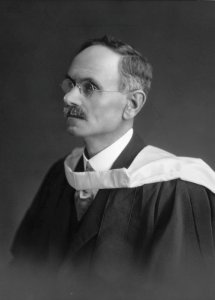
Organist, choirmaster, composer
Born: 1876, Adlington, England
Died: 1950, Christchurch
Active in New Zealand: 1902-1950
John Bradshaw was another British organist who moved to New Zealand for the sake of his health. He was appointed as organist and choirmaster for the Anglican Cathedral in Christchurch, a position he held from 1903 to 1937. In 1908 he was appointed City Organist and maintained a regular recital programme.
He was also appointed to the staff of Canterbury University College rising to the role of professor before retiring in 1841. He was also active in the local branch of the Society of Registered Music Teachers of New Zealand. He composed a number of works, mostly for choir or organ but including an organ symphony. However, in a biography of Bradshaw it is noted that he destroyed all the manuscripts of his compositions.
Compositions
O how amiable are they dwellings (Unpublished, Christchurch, 1904)
Nocturne in F sharp minor (Unpublished, Christchurch, 1908)
Processional for organ (Unpublished, 1908)
Chorale Prelude on Innsbruck (Unpublished, Christchurch, 1927)
Over the wakening landscape: song In: Liberty and learning (Christchurch: University of Canterbury, 1950)
Resources
Brian W. Pritchard. ‘Bradshaw, John Christopher’, Dictionary of New Zealand Biography, first published in 1996. Te Ara – the Encyclopedia of New Zealand, https://teara.govt.nz/en/biographies/3b43/bradshaw-john-christopher (accessed 14 September 2021)
Tucker, F. K. J. C. Bradshaw, Mus.D (Manchester), F.R.C.O., L.R.A.M., A.R.C.M., Hon. F.R.M.C.M: a memoir. (Christchurch: Caxton, 1955)
EN
***********************
Braithwaite, Joseph
Bookseller, stationer, music retailer, publisher
Born: 1848, England
Died: 1917, Dunedin
Active in New Zealand: 1863-1917
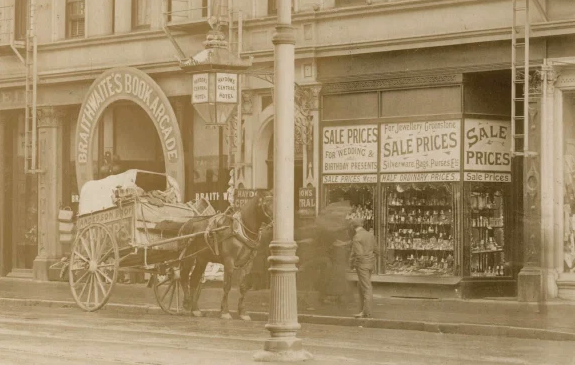
Toitu Otago Settlers Museum, Box 57 Number 200.
Joseph Braithwaite moved with his family to Melbourne in 1852 and then to Dunedin in 1860. He established a small bookshop in 1863, which when it moved to larger premises in 1883 became Braithwaite’s Book Arcade. The business operated until 1928. Braithwaite’s was one of the largest sellers of printed music in Dunedin and also published several pieces, including two albums (Family Song Book, 1891 and Fifty Scots Songs, 1911). Like many of the specialist music businesses Braithwaite’s also published a music album in 1876 (New Zealand Music Album) and catalogues of music they had for sale.
Other resources
Anna Rogers and Max Rogers. Turning the pages: the story of bookselling in New Zealand. (Auckland: Reed Books, 1993)
CG
********************
Branson, Gerald Charles Francis
Singer, voice teacher, composer
Born: 1878, Horsham, Australia
Died: 1945, Australia
Active in New Zealand: -1905
Moving to Melbourne in 1899 to study singing, Branson returned to Dunedin where he taught and sang in a number of choirs. He returned to Melbourne in 1905 and joined some music theatre companies staying in Masterton in 1910 -12. He later settled in Sydney.
Compositions
Our New Zealand boys, and, The game of politics. (Dunedin: Wilkie, 1900)
EN
*********************
Brett, George William Montgomery
Pianist, organist, accountant, local government administrator, commission agent
Born: 1841, Grey Abbey, Ireland
Died: 1916, Gore
Active in New Zealand: 1878 – 1916
An accountant by training, George Brett and his wife spent a few years in the late 1880s teaching music in Gore. Although he ceased music teaching after this time, he continued to be involved with music making in Gore as organist of the local Catholic church, organiser of brass band competitions and conductor of the Gore Choral Society.
Composition
Mataura Valley Waltz (Dunedin: Begg, 1886)
EN
********************
Brett, Henry
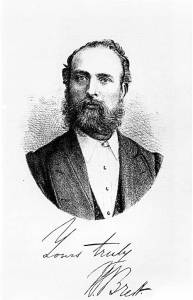
Reference: A 12295
Newspaper proprietor, music benefactor, publisher, journalist, politician, singer
Born: 1843, Hastings, England
Died: 1927, Rotorua
Active in New Zealand: 1862-1927
Sir Henry Brett was a significant figure in the history of Auckland as well as a prominent musical benefactor and supporter. He was proprietor of the Auckland Star, and its printing presses produced over fifty of New Zealand’s locally printed music scores. He sang in Auckland choirs for 50 years, occasionally performing as soloist and donated the organ in the Auckland Town Hall. He was very involved in a range of civic organisations and was for a time Mayor of Auckland.
Resources
Brett, M. ‘Brett, Henry’, Dictionary of New Zealand Biography, first published in 1993. Te Ara – the Encyclopedia of New Zealand, https://teara.govt.nz/en/biographies/2b39/brett-henry (accessed 7 March 2023)
Brett, R. Henry Brett, Kt. – A short history, 1842-1927. Auckland War Memorial Museum Library. MS-1495
EN
********************
Bridge, Herbert Bowen
Librettist, journalist
Born: 1849, Kororareka (Russell)
Died: 1921, Wellington
Born in New Zealand when his father, Major Cypryan Bowen was in command of the 58th Regiment Herbert Bridge was educated in Cheltenham before returning to New Zealand in 1869. He first settled in Akaroa, where he formed a drum and fife band, and in 1887 moved to Wellington, working on all the major newspapers
He was keenly involved in amateur dramatics and wrote several musical sketches including Quits and Gareth and Lynette. He also wrote the libretto for Frederick Jones’ operetta The Monarch of Utopia.
Composition
The New Zealand Jubilee Hymn. (Wellington: Evening Press, 1890)
EN
************************
Brook, Calypso
Pianist, piano teacher, composer
Born: 1885, Auckland
Died: 1966, Auckland
Taught the piano by Miss Ada Yates, Calypso Brook took part in a number of local music competitions. She established her piano teaching practice and her first published compositions appeared in 1916. Later in her life several of her works were recorded, and she composed the March and Fanfare for the 1950 Empire Games in Auckland. Manuscripts for several of her pieces are held in the Australian Music Centre. She recorded a programme of her pieces which was broadcast on the radio station 1YA, and was a member of the Auckland Composers Society.
Compositions
Danse caprice. (Auckland: A. Eady, 1916)
Moonlight memories. (Wellington: Whitcombe & Tombs, 1916)
Waitangi, for military band. (Unpublished, 1934)
Little poi dancer. (Unpublished, 1935) – recorded by Te Mauri Meihana
Will you share my dreams (Unpublished, 1935)
March of the Empire. (Unpublished, 1950) – recorded by the Auckland Waterside Silver Band
EN
********************
Brooke, Harold John
Conductor, choirmaster, pharmaceutical salesman, Anglican vicar
Born: 1859, Yorkshire, England
Died: 1903, Queenstown
Active in New Zealand: 1884?
While living in Whanganui, Brooke was choirmaster at Christ Church, conducted and formed the Wanganui Choral Society. His one published composition was reviewed in the Wanganui Herald which praised the cover illustration but pointed out a multitude of technical errors. He moved to Wellington in 1895 where he continued to be involved with church choirs. He then trained for the Anglican ministry and after a short time in Dunedin was appointed vicar in Queenstown in 1900.
Composition
White violets waltz. (Wellington: Dutton, Brown and Thomson, 1887)
EN
********************
Brown, James (Jim) – composed as Adrian Hope and Raymond Hope
Composer, pianist, teacher
Born: 1875, Dunedin
Died: 1947, 14 July, Christchurch
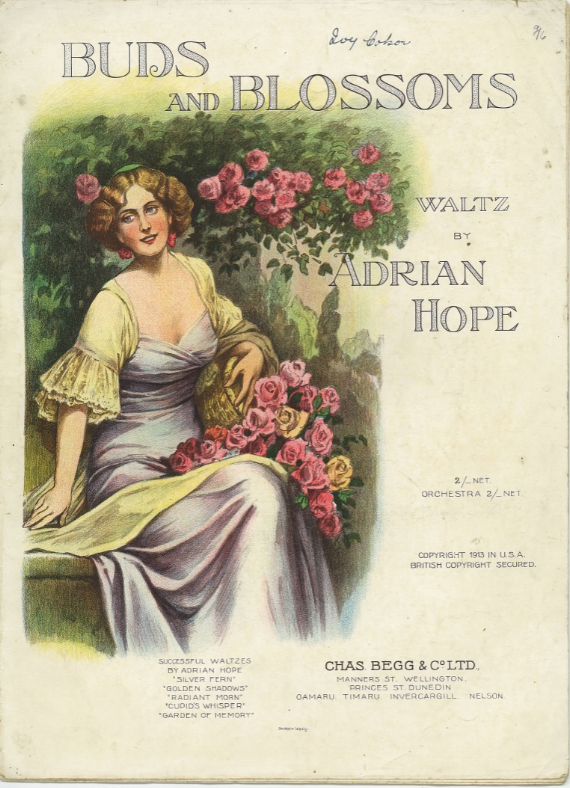
One of the most prolific New Zealand composers, his first piece, the Tarakoi Waltz was published when he was still in his teens. He worked for Fuller’s vaudeville company travelling around New Zealand and Australia for some years and in 1904 in Melbourne as the conductor of Maggie Moore’s company. In 1905 he returned to New Zealand. After being cited in a divorce case in 1911 he moved back to Australia where he converted to Roman Catholicism. He returned to New Zealand sometime before 1937.
Compositions as James Brown
Tarakoi waltz. (Dunedin: Dresden, 1894)
Compositions as Adrian Hope
‘Twas but a dream. (London: Francis Day & Hunter, 1904)
Silver fern waltz. (Dunedin: Charles Begg & Co, 1907)
Golden shadows. (Dunedin: Charles Begg & Co, 1908)
Birthday greetings. (Wellington: Australasian Publishing co, c1910)
Garden of memory. (Dunedin: Charles Begg & Co, c1911)
Cupid’s whisper. (Dunedin: Charles Begg & Co, 1911)
Radiant morn. (Dunedin: Charles Begg & Co, 1911)
Cupid’s charms. (Otahuhu: Boyes, 1912)
Dawn of spring. (Dunedin: Charles Begg & Co, 1913)
Autumn memories. (Dunedin: Charles Begg & Co, c1913)
Buds and blossoms. (Dunedin: Charles Begg & Co, c1913)
Spirit of Napoleon. (London: Charles Begg & Co, 1914)
Shooting star. (London: West & Co, 1916)
Compositions as Raymond Hope
Come back to me. (1906?)
Come back again. (Adelaide?: Cawthorne, 1906)
Teach me to forget. (Dunedin: Wotton, 1906)
Let me forget. (Dunedin: Dresden, 1907)
Queen of my life. (Posen: Malerio, 1907)
Hazel waltz. (Christchurch: Chivers, c1910)
Weeping willow. (Christchurch: Star and Webley, c1910)
Light of the moon . (Christchurch: Chivers, 1910)
New Dominion. (Dunedin: Charles Begg & Co, 1910)
Valse royale. (Christchurch: Gary & Co, c1910)
Forget-me-not. (Christchurch: Harris, 1911)
Sweet lavender. (Christchurch: Chivers, 1911)
On parade. (Christchurch: Chivers, c1911)
Islington valse. (Christchurch: Lowry, 1912)
Good-bye Maoriland. (Christchurch: Whitcombe & Tombs, 1914)
King of the seas. (Melbourne: J Harris & Co, 1916)
My lady’s eyes. (Melbourne: J Harris & Co, 1916)
Her Ladyship. (London: West & Co, 1916)
The red cross or Can’t you spare a penny? (Melbourne: J Harris & Co, 1916)
When our boys march into Berlin. (Christchurch: Lyttleton Times, c1916)
Other resources
Murray, David. “Golden Shadows: an introduction to Raymond Hope.” Unpublished paper.
CG
********************
Brown, Joseph
Conductor, organist, music retailer, government clerk
Born: 1814, Bremhill, Wiltshire, England
Died: 1883, Auckland
Active in New Zealand: 1855-1883
Joseph Brown came to Auckland with experience as a choral scholar, organist of a parish church in Windsor and teacher of pupils from Eton. The musical scene he arrived to in Auckland was much different and he soon became closely involved in the establishment of the Auckland Choral Society which he developed and conducted over many years. He was also organist at St Matthew’s Church for 27 years and during the 1870s imported musical instruments which he sold through Brown and Sons Music Warehouse. He was also employed for many years as a clerk in the Superintendent’s Office and accompanied for many singers and concerts.
Resources
Simpson, A, Hallelujah’s & History: Auckland Choral 1855-2005. (Auckland: Auckland Choral, 2005)
EN
************************
Browne, Ann Maria
Music dealer
Born: 1822, ?
Died: 1902, Gisborne
Active in New Zealand: 1879-1900

From 1879 Mrs A M Browne operated the Beehive, or Mrs A M Browne’s Repository in Gisborne. She had previously lived in Auckland and on the West Coast. Among other things her business sold sheet music and acted as agent for The London & Berlin Piano Co for whom she stocked pianos as well as selling from their catalogue. She also took orders for piano tunings. Ann Browne’s husband, James, was a journalist and later editor of the Poverty Bay Standard and the Poverty Bay Herald. When he retired in 1881 he became a bookseller, independent of his wife’s business but when he died in 1885, she merged the two businesses which she sold in 1900.
CG
********************
Brownlee, George
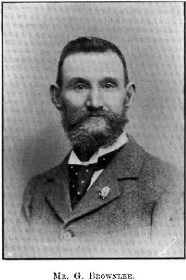
Born: 1841, Kilmarnock, Scotland
Died: 1927, Oamaru
Active in New Zealand: 1863- 1927
Music teacher, seed merchant, organist, Justice of the Peace
George Brownlee arrived in Dunedin in 1863, settling in Oamaru in 1874 where he was a seed merchant and also as a member of the masons. He was a teacher of Tonic Sol-fa in Dunedin and Oamaru and was music master at Oamaru Grammar School.
Publications:
The Otago School Vocalist. (Oamaru: J. G. Flett,1875)
Other resources
Cyclopedia of New Zealand : Otago & Southland Provincial Districts, p. 520 (photo source)
EN
********************
Brunsden, William Walter

Piano and organ tuner and repairer, music retailer, bass singer, music teacher
Born: 1863, England
Died: 1933, Timaru
Active in New Zealand: 1901-1933
Walter Brunsden was a fruiterer in Tasmania before deciding to travel to London to study singing at the Guildhall School of Music. In 1901 he arrived in New Zealand and immediately set up a concert part which toured the Waikato and Auckland areas. In 1902 he settled in Dunedin where he both taught singing and was a piano tuner and repairer for the Dresden and also on his own account. He was a member of the Royal Male Voice Choir, singing solos on occasions.
in 1907 he moved to Timaru where he set up his own business, firstly as a tuner and repairer then expanding to establish Brunsden’s Music Shop. He closed his shop at the end of 1929 but continued to tune and repair instruments. While in Timaru he continued to perform although not as actively as he had in Dunedin. Recordings of him singing featured on 3YA during the 1920s.
EN
***********************
Buckley, Baxter
Pianist, teacher, music dealer
Born: c1875, Lancashire, England
Died: 1920, Wellington
Active in New Zealand: 1904-1920
Baxter Buckley studied the piano in Vienna under Leschetizky where a fellow pupil was Mark Hambourg. He came to New Zealand in 1904 and initially worked for Begg’s in their Dunedin branch selling sheet music. His first public recital was in their piano showroom in September 1904. Buckley later moved to Wellington where he performed professionally and also taught the piano; Esther Fisher was one of his pupils. Charles Bayertz and L D Austin both considered him New Zealand’s finest pianist of his time.
CG
Bunz, Carl Ferdinand
Music dealer, musician, teacher
Born: 1844, 23 October, Holstein, Denmark
Died: 1923, Christchurch
Active in New Zealand: 1868-1923
Carl Bunz received his musical education in Eitien, Denmark. In 1868 he went to London and then to Christchurch.
In Christchurch he was bandmaster of the Canterbury Yeomanry Cavalry Band and leader of the Musical, Philharmonic, and Mendelssohn Societies. He could play many instrument orchestral instruments, but his principal instruments were the clarinet, violin, and double bass. For over forty years Carl Bunz was leader of the theatre orchestra—first in the Gaiety Theatre, then in the old Theatre Royal, and lastly in the new Theatre Royal.
Around 1874 he opened a Music Warehouse which seems to have operated until at least 1878, when it was taken over by G. Merton. His son Alfred became a leading conductor in Christchurch.
Compositions:
Polka mazurka. (1871, Unpublished)
Resources
Jane, Philip. An Historical survey of the establishment of an orchestral tradition in Christchurch to 1939. (PhD thesis, University of Canterbury, 2009). Includes photo.
CG
********************
Burke, Edmund James
Music teacher (violin and piano), string band leader
Born : 1870, Auckland
Died: 1953, Auckland
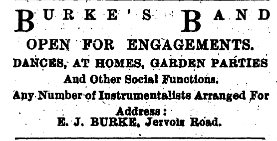
Pupil of Martin Swallow. Toured New Zealand as an orchestra player, arranger and musical director for theatrical orchestras, including Fullers Vaudeville. Choirmaster of St John’s the Baptists’ Church, Parnell (1890-) and conductor of the Auckland Banjo, Mandolin and Guitar Club. Conductor of many Auckland orchestras and ensembles from aged 19, with his own String orchestra.
Compositions
Little Monte Christo: burlesque.
Forget me.
Aladdin up to date: selected items. (1890, unpublished)
John Bull and Uncle Sam. (Auckland: Burke, 1917)
Valse roie. (Auckland: A. W. Robertson & Son, c1908)
Other resources
Cyclopedia of New Zealand : Auckland Provincial District, p. 259
EN
********************
Burnes-Loughnan, Mary Ethel (Mai)
Pianist, composer
Born: 1868, 28 May, Melbourne, Australia
Died: 1930, 27 November, Christchurch
Mary Ethel Burnes-Loughnan, or as she was usually known “Mai”, was born in Australia but lived her early life in France. Her musical training is unknown but soon after she migrated to Christchurch with her family there are references to her accompanying singers on the piano. She trained as a nurse but after a short time opened a tea kiosk in Wellington along with 2 colleagues. Shortly after this she returned to the South Island to marry Henry Hamilton Loughnan, a leading lawyer in Christchurch and also a keen amateur cellist.
Burnes-Loughnan was a tireless supporter of various charities and often hosted fundraising concerts, as well as acting as accompanist. Four of her songs were published by Allan’s in Melbourne during the 1910s, with one, Ships that passed in the night was also produced in an American edition. Two of her other unpublished songs, Commandeered, and Morning at your window smiles, were performed at the 1918 Christchurch Festival of New Zealand music concert.
Published compositions:
Contingent march “Patua te hoariri” . (Christchurch: Lyttleton Times, 1914)
I gave you a gift. (Melbourne: Allan, 1916?)
Ships that passed in the night. (Melbourne: Allan, 1919) and (New York: Hinds, Hayden)
EN
********************
Burr, Edward Albert
Violin maker, public servant
Born: 1862, Foxton
Died: 1938, Wellington
Like his contemporary James Williamson, Edward Burr worked for the Post and Telegraph Department. He produced his first violin in 1900 but it was after his retirement that he dedicated his time to producing a number of violins and violoncellos. Among those who used his instruments were Zillah Castle and Vivienne Blamires.
Resources
Henley, W. Universal Dictionary of violin and bow makers. (Brighton: Amati, 1959). Vol. 1, p182.
EN
********************
Burrett, Robert
Printer, lithographer, engraver, bookbinder, music and bookseller, stationer.
Born: 1830, Newcastle-upon-Tyne, England
Died: 1886, Wellington
Active in New Zealand: 1863-1886
Robert Burrett set up a shop in Wellington from which he also operated his printing services. From 1872 he advertised the ability to print music and produced scores for Cimino, Flood and Neill amongst others.
EN
********************
Burry, Frederick Charles
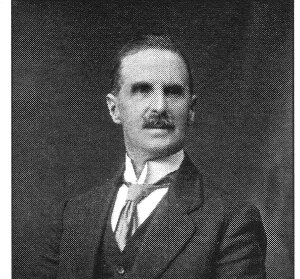
Organist, music teacher, composer, conductor
Born: 1860, 16 February, Christchurch, Hampshire, England
Died: 1943, Oamaru
Active in New Zealand: 1903-1943
Pseudonym: Frank Talbot
Burry came to Oamaru from Wagga Wagga, New South Wales where he had been an organist for almost 20 years. He seems to have arrived in Australia in 1883, stopping first in Goulburn then Bega before settling in Wagga Wagga. He advertised as having been organist at Christ Church, Croydon, England but his first performances in Australia were as part of a musical variety group.
He was appointed as organist at St Luke’s Church, Oamaru and arrived in 1903. He also taught privately as well as at Waitaki Boys High School and was a masonic organist. He composed a number of works several of which were published both under his own name and under the pseudonym, Frank Talbot.
Compositions:
Suite for ‘cello and piano. (Unpublished)
Summer dreams. (Dunedin: Begg’s, 1903)
Winsome. (Dunedin: Begg’s 1910) – as Frank Talbot
Fascination Dunedin: Begg’s, 1912?) and (Sydney: Palings, 1912) – as Frank Talbot
As the hart panteth. (Unpublished)
Come unto me. (Unpublished)
Left, left left! (Sydney: Palings, 1916)
Love’s garden. (London: Arthur H. Stockwell, 1937)
EN
********************